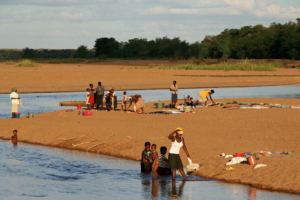The Salvation Army’s Efforts in Zimbabwe

For generations, the Salvation Army has been an international movement of evangelism, goodwill and charity. As part of the Protestant denomination in Christianity, the organization holds more than 1.6 million members throughout 109 countries around the world. Originating in the U.K., there are over 800 parishes, 1,500 ordained ministers and 54,000 members in England. Motivated by the love of God, the organization’s mission is to preach the gospel of Jesus Christ and meet the needs of humans whom hardships have struck. Most recently, The Salvation has been working in Zimbabwe. The Salvation Army’s efforts in Zimbabwe have involved providing communities and schools with proper sanitation.
In 1865, pastor William Booth and his wife, Catherine, began preaching to London’s neglected poor. William’s dynamic presence of natural leadership and charismatic oration grabbed the attention of the congregation. At the same time, Catherine pioneered advocacy for women’s rights in the Christian community. Subsequently, the couple embraced the Christian Mission and quickly offered the destitute meals, clothes and lodging. When others joined the Booths to assist with their corporal works, the Christian Mission became an almost overnight success. In 1878, this success transformed into the organization known today as the Salvation Army.
The Salvation Army Expansion
With substantial growth in motion, there was a militant approach to the newfound identity, like integrating uniforms for ministers and members. In addition, the Salvation Army began introducing flags and employee rankings. This gave the members an opportunity to embrace the “spiritual warfare” mentality.
As a result of the militarization-like growth, the organization began to spread to the United States in 1880, where the first branch opened in Pennsylvania. Through time, the Salvation Army played a pivotal role in the lives of the misfortunate, especially during the Great Depression.
Branches began opening around the world to establish evangelical centers, substance abuse programs, social work and community centers. The organization even opened used goods stores and recreation facilities to support community welfare.
International Impact
Currently, The Salvation Army supports emergency response initiatives throughout underprivileged countries in South America, Southeast Asia and Africa. Most recent works include providing food, water and materials to rebuild homes in Zimbabwe after flooding in Tshelanyamba Lubhangwe.
Additionally, it has launched a new plan to aid issues with water and sanitation in Zimbabwe. With nearly 20 percent of the world’s population lacking access to clean water and one out of every three people without basic sanitation needs, obtaining clean drinking water can be challenging in Zimbabwe. More than half of the water supply systems do not function properly and as a result, many boreholes and wells contain water that is unsafe to drink, making them nonpotable for villagers and farmers. People are experiencing outbreaks of diseases that have led to avoidable deaths due to unclean water and sanitation in Zimbabwe, and/or little knowledge of self-sanitation care. Some schools are even on the verge of closing due to the posing health threat to Zimbabwe’s youth.
WASH Initiative in Zimbabwe
The Salvation Army adopted the WASH project to improve health and nutrition in 12 communities by advancing water and sanitation in Zimbabwe. WASH, which stands for Water, Sanitation and Health, supports more than 50,000 people living in Zimbabwe, including more than 11,000 children attending school. Introducing accountability for the intertwining relationships of water, sewage, nutrition and health, Zimbabwe now has access to sustainable water and sanitation facilities.
The Salvation Army’s efforts in Zimbabwe have stretched to installing toilets, sinks and clean water in schools, allowing them to remain open. Furthermore, school hygiene committees have visited schools to give teachers the proper training about hygiene, health care and clean food. Each of these 12 communities have also set up farm gardens and irrigation systems. This has allowed areas to take back autonomy over food sources and will ultimately reduce the chances of consuming contaminated food, leading to foodborne illness.
UNICEF Joins the Salvation Army in Zimbabwe
The United Nations Children Fund (UNICEF) has also joined the Salvation Army’s efforts in Zimbabwe to help people access water and sanitation by drilling boreholes and pipe schemes for water systems. In addition, the WASH program saw vast improvements in repairing the sewer systems in 14 communities followed by the sustainability of those systems through the strength and development of its national public-private strategic framework.
UNICEF has also supported the improvement of water and sanitation in Zimbabwe through approval of hygiene and sanitation policy with the focus of ending open defecation in the country by the year 2030, specifically for gender-sensitive citizens. Efforts like policy implementation directly align with the Sustainable Development Goals. Moreover, UNICEF has supported the Sanitation Focused Participatory Health and Hygiene Education (SafPHHE) in over 40 rural districts in Zimbabwe to accomplish the end of open defecation.
The Salvation Army has aimed to improve the quality of life for the underprivileged with the message of a strong belief in God and that every individual should have access to basic human rights. The Salvation Army’s efforts in Zimbabwe and around the world have provided aid through consistent outreach to the less fortunate. The organization started out with the motivation to save souls and has grown to steer the directionless down a path to righteousness and out of poverty. With endeavors like improving water and sanitation in Zimbabwe, organizations like the Salvation Army and UNICEF have greatly improved lives throughout poor countries.
– Tom Cintula
Photo: Flickr
